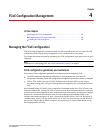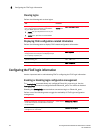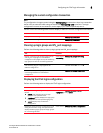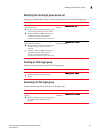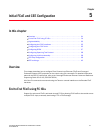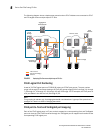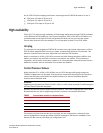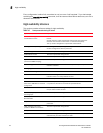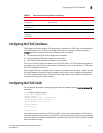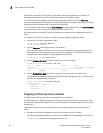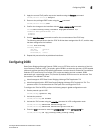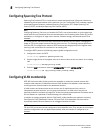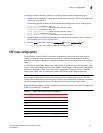
Converged Enhanced Ethernet Administrator’s Guide 33
53-1002163-02
High availability
5
DRAFT: BROCADE CONFIDENTIAL
On an FCOE10-24 this mapping is as follows, assuming that the FCOE10-24 blade is in slot 4:
• FCoE port 4/0 maps to TE port 4/0
• FCoE port 4/1 maps to TE port 4/1
• FCoE port 4/23 maps to TE port 4/23
High availability
Fabric OS v7.0.0 ensures high availability of FCoE storage traffic going through FCOE10-24 blades
on the DCX and DCX-4S platforms. If the Control Processors (CPs) on the DCX or DCX-4S are in a
redundant state and the active CP fails, the standby CP takes over the control of the system.
Failover from the active CP to the standby CP is non-disruptive to both FC and FCoE traffic.
Hot plug
The procedure for hot-plugging an FCOE10-24 is similar to any other blade supported on a DCX or
DCX-4S. When diagnostics are running on a blade, a slotpoweroff operation is not allowed. This
behavior is similar to what has been supported in the previous FOS releases.
When a core blade on a DCX or DCX-4S is removed, the traffic flowing through the ASICs in that
blade is re-routed to use the ASICs in the other core blade in the chassis. This increases the
congestion, but the switch continues to operate in an over-subscribed mode. When both the core
blades are removed, then all the blades in the chassis are disabled.
Control Processor failover
When the active CP in a DCX or DCX-4S fails over, the FCoE storage traffic going through the
FCOE10- 24 blades are not disrupted. Critical protocol components are brought online quickly to
ensure that PDUs are transmitted to the adjacent switches so that the associated protocol
sessions are not declared dead.
ATTENTION
Upgrading your firmware from Fabric OS v6.3.x, v6.4.0, or v6.4.1 does not cause FC traffic disruption
but does cause FCoE traffic disruption.
Brocade recommends that the protocol timeout values in Table 9 be configured both on the local
Brocade switches, as well as neighboring switches, to ensure non-disruptive HA failover.
Full recovery of all services can take up to a minute. No new configuration is allowed for that
period. Configuration manager generates a RASLOG message to indicate the availability of the
standby CP after recovery to accept new configuration CLIs.
TABLE 9 Protocol timeout values for non-disruptive failover
Protocol type Time interval
LACP Long timeout = 90 seconds (default value)
FIP Hello Interval = 8 seconds (default value)
RSTP 3 Second Hello (9 second session timeout)
MSTP 3 Second Hello (9 second session timeout)



